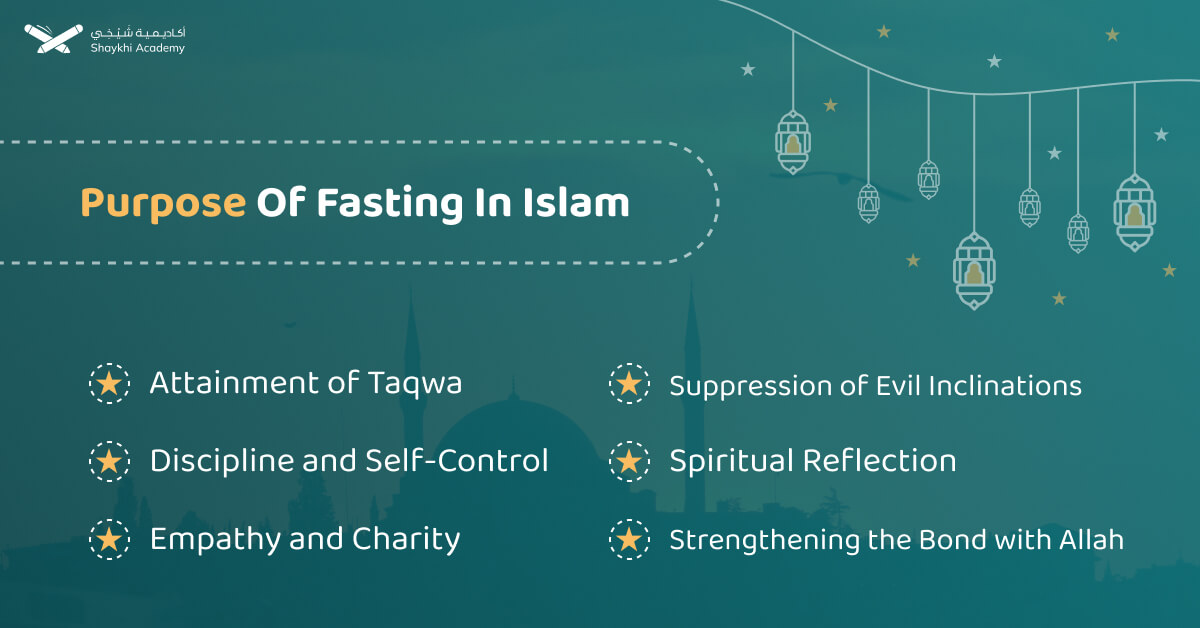Purpose And Importance Of Fasting In Islam: Fasting in Islam serves multiple purposes and holds significant importance in the lives of Muslims. Firstly, fasting is a means to attain taqwa, or God-consciousness, as prescribed by Allah in the Quran.
Through abstaining from food, drink, and other desires during the daylight hours of Ramadan, Muslims aim to develop a heightened awareness of Allah’s presence in their lives and strive to live in accordance with His commandments. This practice fosters self-discipline and helps individuals lead a life of righteousness and devotion to Allah.
What Is The Purpose Of Fasting In Islam
Fasting in Islam is not merely abstaining from food and drink; it is a comprehensive act of worship that fosters spiritual growth, self-discipline, and empathy towards others. It is a means to attain taqwa, strengthen one’s relationship with Allah, and lead a life of righteousness and devotion. May Allah grant us the ability to observe fasting sincerely and reap its numerous purposes.
1. Attainment of Taqwa (God-Consciousness)
Fasting in the month of Ramadan, as prescribed by Allah, serves a profound purpose: the attainment of taqwa (God-consciousness). Allah says in the Quran: “O you who have believed, decreed upon you is fasting as it was decreed upon those before you that you may become righteous” (Surah Al-Baqarah 2:183). The essence of taqwa lies in obeying Allah’s commandments and abstaining from what He has forbidden.

2. Discipline and Self-Control
Fasting teaches discipline and self-control by restraining oneself from food, drink, and sexual desires during the daylight hours. This practice helps individuals learn to control their desires and impulses, fostering a stronger willpower and resilience to face life’s challenges.
3. Empathy and Charity
Experiencing hunger and thirst during fasting cultivates empathy towards the less fortunate. The fasting person is encouraged to be more charitable and compassionate towards those who suffer from poverty and deprivation, leading to increased acts of kindness and generosity.
4. Suppression of Evil Inclinations
Fasting serves as a means to suppress evil inclinations and desires. By refraining from permissible acts such as eating and drinking during fasting hours, individuals learn to control their desires and avoid sinful behavior, thus drawing closer to Allah.
5. Spiritual Reflection and Remembrance of Allah
Fasting encourages individuals to engage in spiritual reflection and remembrance of Allah. The fasting person becomes more mindful of their actions and intentions, striving to please Allah and avoid anything that may displease Him.
6. Strengthening the Bond with Allah
Through fasting, individuals strengthen their bond with Allah and increase their devotion to Him. Fasting is a unique form of worship that is exclusively rewarded by Allah, signifying the special relationship between the servant and the Creator.
7. Preparation for Life’s Challenges
Fasting prepares individuals to face life’s challenges with patience, resilience, and determination. By overcoming physical hunger and thirst, individuals develop the resilience needed to tackle various trials and hardships in life.
8, Fulfillment of Allah’s Commandments
Ultimately, fasting serves as a means to fulfill Allah’s commandments and seek His pleasure. It is a form of worship that encompasses various dimensions, including spiritual, physical, and social aspects, all aimed at achieving closeness to Allah and righteousness in conduct.

9. Purification of the Heart and Moral Refinement
Fasting purifies the heart, removing impurities such as greed, arrogance, and hatred. By abstaining from worldly pleasures, a person focuses on spiritual growth and moral refinement. It encourages a person to examine their character, discard sinful habits, and adopt virtuous ones, ultimately leading to self-improvement.
10. Seeking Forgiveness and Closer Relationship with Allah
Fasting, especially during the month of Ramadan, is a means to seek Allah’s forgiveness for past sins. Allah, in His mercy, forgives those who fast with sincerity and expect reward from Him. It is also an opportunity for Muslims to deepen their relationship with Allah, seeking His mercy, blessings, and closeness through acts of worship, prayer, and reflection.
11. Spiritual Reflection and Contemplation
Fasting provides a unique opportunity for contemplation. When a person refrains from food, drink, and other distractions, they can focus on their inner self and reflect on their actions. This time of introspection helps individuals assess their deeds and renew their commitment to Allah, reinforcing their spiritual path.
12. Strengthening Patience and Gratitude
Fasting is a practice that strengthens patience as individuals endure hunger and thirst. The ability to endure without complaint teaches Muslims the value of patience, not only during Ramadan but in all aspects of life. Fasting also instills gratitude for the blessings that we often take for granted, such as food, drink, and comfort.
13. Empathy and Solidarity with the Poor
By experiencing hunger and thirst, fasting cultivates empathy for those who suffer from poverty. Muslims develop a deeper understanding of the struggles of the less fortunate and are motivated to engage in acts of charity, supporting those in need. This sense of brotherhood and solidarity strengthens the bonds within the community.
14. Controlling Desires and Weakening Satan
Fasting teaches individuals to control their desires, especially when they feel the temptation to indulge. It is also said that fasting weakens the influence of Satan, whose whispers are less effective when a person is fasting. As fasting narrows the pathways of Satan, it also enables Muslims to avoid sins and act in accordance with Allah’s guidance.
15. Renouncing Worldly Pleasures for Divine Reward
Fasting encourages Muslims to renounce temporary worldly pleasures in favor of spiritual rewards. By focusing on worship and self-restraint, the fasting person desires the eternal rewards from Allah, leading to an increased longing for what is with Allah rather than the fleeting pleasures of the world.
16. Time Management and Focus on Worship
Fasting helps Muslims manage their time more effectively, as they structure their day around acts of worship, reflection, and personal growth. With the increased mindfulness and appreciation for time, fasting encourages individuals to prioritize spiritual pursuits and strengthen their devotion to Allah.

Conclusion:
In conclusion, fasting in Islam is much more than just abstaining from food and drink; it is a profound spiritual practice that shapes the lives of Muslims in multiple ways. The primary purpose of fasting is to attain taqwa, or God-consciousness, as it brings individuals closer to Allah, guiding them to lead lives of righteousness, discipline, and devotion.
Fasting cultivates a sense of solidarity with the less fortunate and strengthens one’s bond with Allah, encouraging acts of charity and kindness. Moreover, it serves as a reminder of the transient nature of worldly pleasures and redirects the focus towards seeking Allah’s eternal rewards. As a holistic form of worship, fasting promotes a deeper understanding of one’s purpose in life, while enhancing self-control, resilience, and time management.
















































